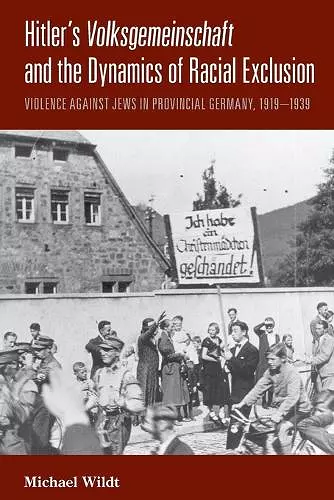Hitler's Volksgemeinschaft and the Dynamics of Racial Exclusion
Violence against Jews in Provincial Germany, 1919–1939
Format:Paperback
Publisher:Berghahn Books
Published:1st Jul '14
Should be back in stock very soon

In the spring of 1933, German society was deeply divided – in the Reichstag elections on 5 March, only a small percentage voted for Hitler. Yet, once he seized power, his creation of a socially inclusive Volksgemeinschaft, promising equality, economic prosperity and the restoration of honor and pride after the humiliating ending of World War I persuaded many Germans to support him and to shut their eyes to dictatorial coercion, concentration camps, secret state police, and the exclusion of large sections of the population. The author argues however, that the everyday practice of exclusion changed German society itself: bureaucratic discrimination and violent anti-Jewish actions destroyed the civil and constitutional order and transformed the German nation into an aggressive and racist society. Based on rich source material, this book offers one of the most comprehensive accounts of this transformation as it traces continuities and discontinuities and the replacement of a legal order with a violent one, the extent of which may not have been intended by those involved.
“Wildt offers a deep impression of what it actually meant for Jews to live in a society defined as a Volksgemeinschaft at least by its leaders…[His] book offers readable and detailed insight into what it meant to produce Volksgemeinschaft. It is by now a standard work on the early years of National Socialist anti-Semitism and supplies an inspiring view on the transformation of German society between the years 1919 and 1939.” · H-Net
"Hitler's Volksgemeinschaft convincingly blends larger conceptual claims with detailed historical analysis of specific localities. One cannot walk away from the book still thinking that the German population in Hitler's Germany was oblivious to, or unwilling to endorse, years of violently exclusionary mechanisms set in motion against Jews - the prelude to their eventual extermination." · Holocaust and Genocide Studies
“[Wildt’s] interpretation contests some of the established assessments. Even though the role of the ‘Volksgemeinschaf’ in this process is debatable, the concept inspired a study worth reading…[It]is definitely a thought-provoking book.” · Journal of Contemporary European Studies
"This is a nuanced, provocative, and important book." · American Historical Reviews
“For a relatively compact work of under three hundred pages of main text, the thick, compelling narratives and insightful historiographic remarks make this an unusually engaging book, one that is certain to enlighten seasoned scholars as well as those embarking on a serious study of the Third Reich.” · The Journal of Modern History
“Michael Wildt is one of the most innovative historians of contemporary history working in Germany today… His scholarship is marked by imaginative questions and answers that are arrestingly original, patiently reconstructed, close to the sources, and justly influential…Like much of his previous work, …[his book] impresses not just for reinterpreting a topic…but for recalibrating our lens onto the Third Reich.” · Yad Vashem Studies
“Michael Wildt’s account will stimulate academic as well as public debate about the causes and underlying effects of the Nazis’ persecution of the Jews and shed new light on the Nazi regime’s criminal actions against those excluded from the Volksgemeinschaft before 1939. It contradicts the recent tendency to [portray] the Germans as the victims of the Nazi system and reactivates public consciousness of occurrences that have all too often been pushed aside.” · Hans Mommsen in Frankfurter Rundschau
“Wildt has become in recent years one of the most renowned scholars on Nazi Germany, or, indeed, of contemporary history, thanks in particular to his generational collective biography of a decisive group of perpetrators of the Holocaust, the leadership corps of the Reichssicherheitshauptamt. [….] The value of this book lies in the wide-ranging intellectual links in which the author embeds his empirical material: from the sanctions of honor in the Middle Ages to Carl Schmitt, from an anthropology of violence to the European context of anti-Jewish pogroms.” · Paul Nolte in die tageszeitung
"Based on a close reading of newly discovered, disturbing archival sources, Michael Wildt, one of the most prolific historians of the Third Reich, shows that anti-Jewish violence was already omnipresent in Nazi Germany before 1939. Hitler’s Volksgemeinschaftand the Dynamics of Racial Exclusion demonstrates that the Nazi Volksgemeinschaft was not just a product of Goebbels' propaganda machinery but brutal reality - a national community based on daily terror. Wildt's book is a must-read for every historian of twentieth-century Germany and the Holocaust." · Thomas Kühne, author of Belonging and Genocide: Hitler's Community, 1918-1945
ISBN: 9781782386704
Dimensions: unknown
Weight: 435g
322 pages